Are you looking to monetize your education-related content and earn revenue online? Education affiliate networks provide an excellent opportunity to promote courses, learning platforms, eBooks, and other educational products while earning commissions for each referral or sale.
With the growing demand for online learning in 2026, partnering with the right education affiliate networks can help you tap into a highly engaged audience and generate a steady income stream. These networks connect publishers and affiliates with reputable education brands, making it easier to promote relevant products to your audience.
In this article, we’ll explore the 10 best education affiliate networks in 2026, highlighting their key features, commission structures, and benefits. By the end, you’ll have a clear understanding of which networks are best suited to help you maximize your earnings in the education niche.
What is Affiliate Marketing
Affiliate marketing is a performance-based marketing strategy where individuals or businesses (affiliates) earn commissions by promoting products or services offered by another company (the merchant). In the context of education, affiliates promote various educational products such as online courses, e-books, tutoring services, and educational software. When a consumer makes a purchase or signs up for a service through an affiliate’s unique referral link, the affiliate earns a commission.
The process typically involves several steps:
- Joining an Affiliate Network: Affiliates sign up with an education-focused affiliate network that connects them with various merchants offering educational products.
- Choosing Products to Promote: Affiliates select which products or services they want to promote based on their audience’s interests and needs.
- Generating Unique Links: The network provides affiliates with unique tracking links that they can use in their promotional content.
- Promoting Products: Affiliates use various channels such as blogs, social media, email newsletters to promote the selected educational products.
- Earning Commissions: When users click on the affiliate link and make a purchase or sign up for a service, the affiliate earns a commission based on the agreed-upon rate.
Benefits of Affiliate Marketing for Educational Content Creators
- Monetization Opportunities: For educators and content creators, affiliate marketing provides a way to generate income from their existing audience by promoting relevant educational products.
- Passive Income Potential: Once affiliates set up their promotional content, they can earn commissions passively as long as users continue to engage with their links.
- Diverse Product Offerings: The education sector offers a wide range of products and services to promote, allowing affiliates to choose those that best fit their niche and audience.
- Low Startup Costs: Starting as an affiliate marketer typically requires minimal investment compared to creating and selling your own educational products.
- Skill Development: Engaging in affiliate marketing helps content creators develop valuable skills in digital marketing, SEO, social media management, and content creation.
- Flexibility: Affiliates can work at their own pace and schedule while promoting products they are passionate about within the education sector.
- Networking Opportunities: Joining an education affiliate network allows affiliates to connect with other marketers and industry professionals, leading to potential collaborations and partnerships.
- Access to Analytics: Many affiliate networks provide detailed analytics tools that help affiliates track their performance metrics, allowing them to optimize their strategies over time.
Importance of Education Affiliate Networks
Education affiliate networks have become increasingly important in the online marketing landscape, providing a platform for educators, content creators, and marketers to promote educational products and services.
These networks connect affiliates with educational institutions, e-learning platforms, and other businesses that offer courses, tutoring services, and educational materials. By leveraging affiliate marketing, these entities can reach a wider audience while affiliates can earn commissions for their promotional efforts.
Criteria for Selecting Education Affiliate Networks
When choosing an education affiliate network to join, several key criteria should be considered:
Commission Structure
The commission structure is one of the most critical factors when selecting an education affiliate network. Different networks offer various payment models:
- Pay-per-Sale (PPS): Affiliates earn a commission when a sale is made through their referral link.
- Pay-per-Lead (PPL): Affiliates receive compensation for generating leads—typically when users sign up for free trials or newsletters.
- Hybrid Models: Some networks may offer a combination of both PPS and PPL models, providing flexibility in how affiliates can earn commissions.
Understanding these structures is essential for maximizing earnings in this competitive niche.
Reputation and Reliability
The reputation of an affiliate network plays a significant role in determining its reliability:
- Track Record: Researching reviews from other affiliates can provide insights into how well the network operates regarding payment timeliness and support responsiveness.
- Fraud Prevention Measures: A reputable network implements stringent measures against fraudulent activities like click fraud or unauthorized transactions.
- Transparency: Clear communication regarding commission structures, payment schedules, and program requirements fosters trust between merchants and affiliates.
Choosing a reliable network helps ensure that both parties maintain positive relationships while minimizing disputes related to payments or performance metrics.
Range of Products/Services Offered
A diverse range of educational products is essential when selecting an affiliate network:
- Online Courses: Many networks partner with e-learning platforms that offer various courses on topics ranging from academic subjects to professional development.
- Tutoring Services: Affiliates can promote tutoring platforms that connect students with qualified tutors in various subjects.
- Educational Software: Software solutions for learning management systems (LMS), study aids, or classroom management tools are also valuable offerings.
- E-books and Study Materials: Promoting digital books or resources that assist students in their studies can be another lucrative avenue.
Having access to multiple types of educational products allows affiliates to target different audience segments effectively while adapting their strategies based on market trends.
Support and Resources Available
The level of support provided by an education affiliate network can significantly impact its effectiveness:
- Training Programs: Many successful networks offer training sessions or resources that help affiliates understand best practices in promoting educational products effectively.
- Marketing Materials: Access to high-quality banners, text links, and promotional content enhances an affiliate’s ability to drive traffic and conversions.
- Dedicated Account Management: Some networks provide personal account managers who assist affiliates in optimizing campaigns and addressing any challenges they may encounter.
A well-supported network not only facilitates smoother operations but also empowers affiliates to maximize their potential earnings.
10 Best Education Affiliate Networks in 2026
Education affiliate networks provide a valuable opportunity for affiliates to earn commissions by promoting educational products and services. These networks connect educational institutions, online learning platforms, and course creators with affiliates who can drive traffic and generate leads. Below are 10 of the best education affiliate networks, detailing their unique features and commission structures.
- Udemy
- Coursera
- Skillshare
- Teachable
- LinkedIn Learning
- Khan Academy
- edX
- Codecademy
- Pluralsight
- MasterClass
1. Udemy Affiliate Program

Overview and Commission Details
Udemy is one of the largest online learning platforms, offering a vast array of courses across various subjects. The Udemy Affiliate Program allows affiliates to earn commissions by promoting courses available on the platform.
Commission Structure:
Affiliates can earn up to 50% commission on each sale generated through their referral links. This high commission rate makes it an attractive option for affiliates looking to monetize their content.
Payment Options:
Udemy pays affiliates through PayPal, and there is a minimum payout threshold of $50.
2. Coursera Affiliate Program

Overview and Commission Details
Coursera partners with top universities and organizations to offer high-quality online courses, specializations, and degrees. The Coursera Affiliate Program provides affiliates with a chance to promote these educational offerings.
Commission Structure:
Affiliates can earn up to 45% commission on eligible purchases made through their referral links. This includes courses, specializations, and professional certificates.
Payment Options:
Payments are processed through the Impact affiliate network, with options for direct deposit or checks. There is a minimum payout threshold of $50.
3. Skillshare Affiliate Program
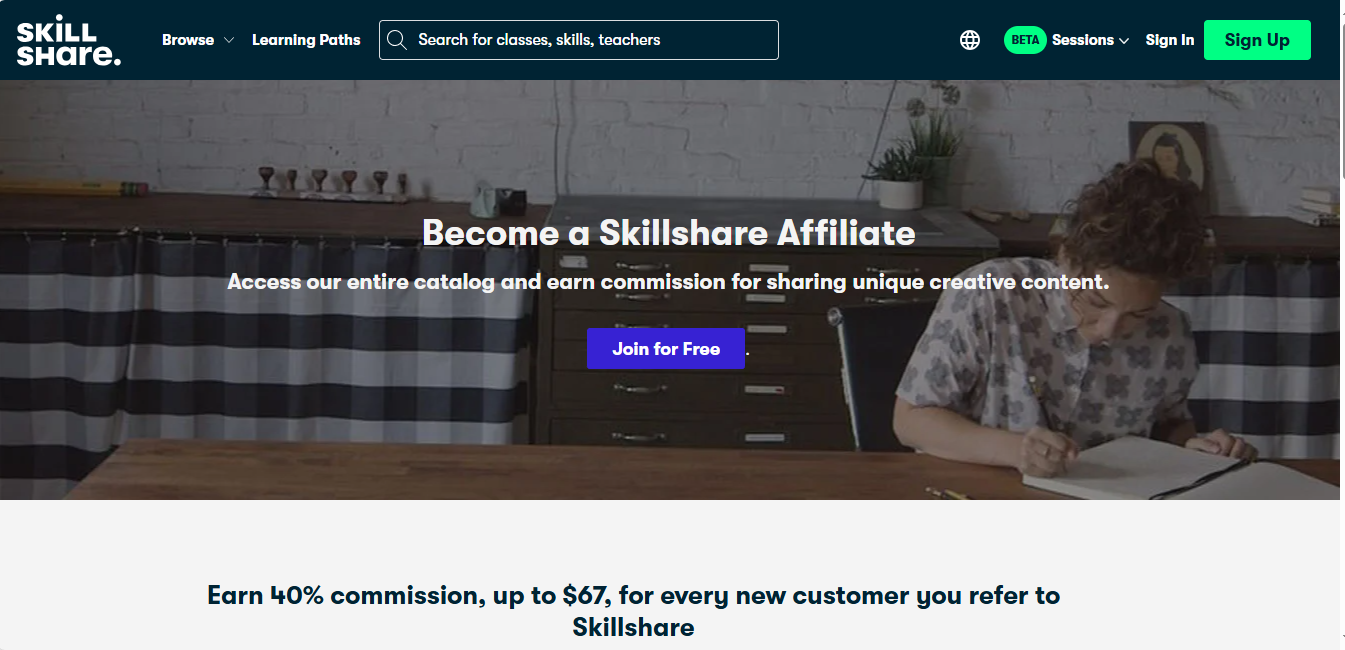
Overview and Commission Details
Skillshare is a popular online learning community that offers thousands of classes in creative fields such as design, photography, writing, and more. The Skillshare Affiliate Program allows affiliates to promote these classes to earn commissions.
Commission Structure:
Affiliates earn $10 for each new customer who signs up for a premium membership using their referral link.
Payment Options:
Payments are made via PayPal, with a minimum payout threshold of $30.
4. Teachable Affiliate Program
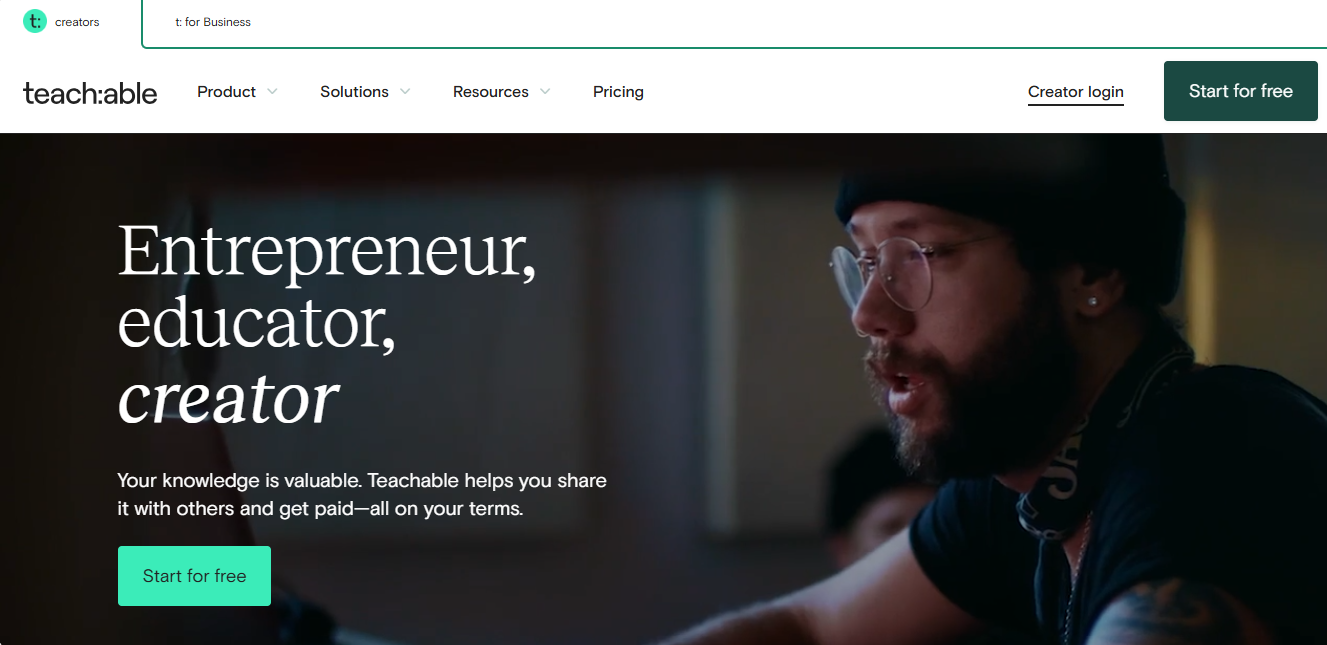
Overview and Commission Details
Teachable is a platform that allows individuals and businesses to create and sell their own online courses. The Teachable Affiliate Program enables affiliates to promote courses created by others on the platform.
Commission Structure:
Affiliates can earn 30% commission on each sale made through their referral links. This applies to both course sales and subscription plans.
Payment Options:
Payments are processed via PayPal or direct deposit, with a minimum payout threshold of $50.
5. LinkedIn Learning Affiliate Program

Overview and Commission Details
LinkedIn Learning offers a wide range of professional development courses across various industries. The LinkedIn Learning Affiliate Program allows affiliates to promote these courses to earn commissions.
Commission Structure:
Affiliates earn up to 35% commission on new subscriptions initiated through their referral links.
Payment Options:
Payments are made via direct deposit or checks, with a minimum payout threshold of $50.
6. Khan Academy Affiliate Program
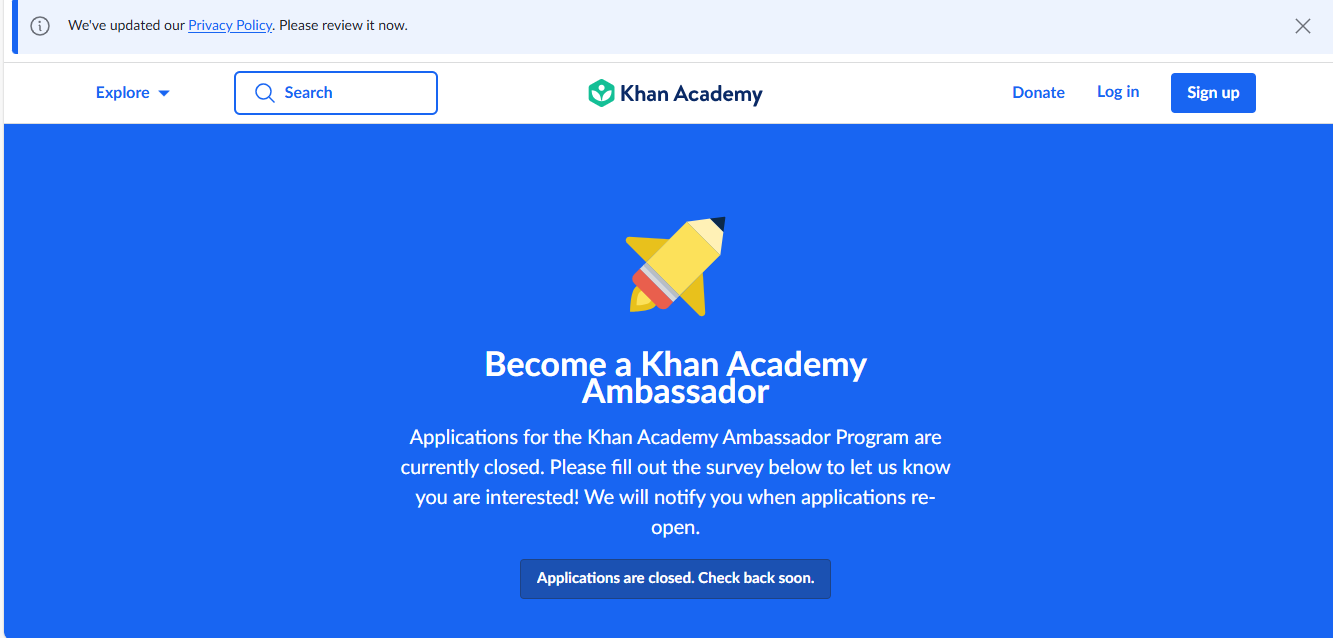
Overview and Commission Details
Khan Academy is a nonprofit organization that provides free educational resources in subjects ranging from math to science and humanities. While Khan Academy does not have a traditional affiliate program, it encourages partnerships that can help spread awareness of its resources.
Unique Features:
Affiliates can promote Khan Academy’s resources without earning commissions but can benefit from increased traffic to their platforms by providing valuable educational content.
7. edX Affiliate Program

Overview and Commission Details
edX is an online learning platform founded by Harvard University and MIT that offers high-quality courses from top universities around the world. The edX Affiliate Program allows affiliates to promote these courses for commissions.
Commission Structure:
Affiliates can earn up to 10% commission on course enrollments made through their referral links.
Payment Options:
Payments are processed via PayPal or bank transfer, with a minimum payout threshold of $100.
8. Affiliate Program
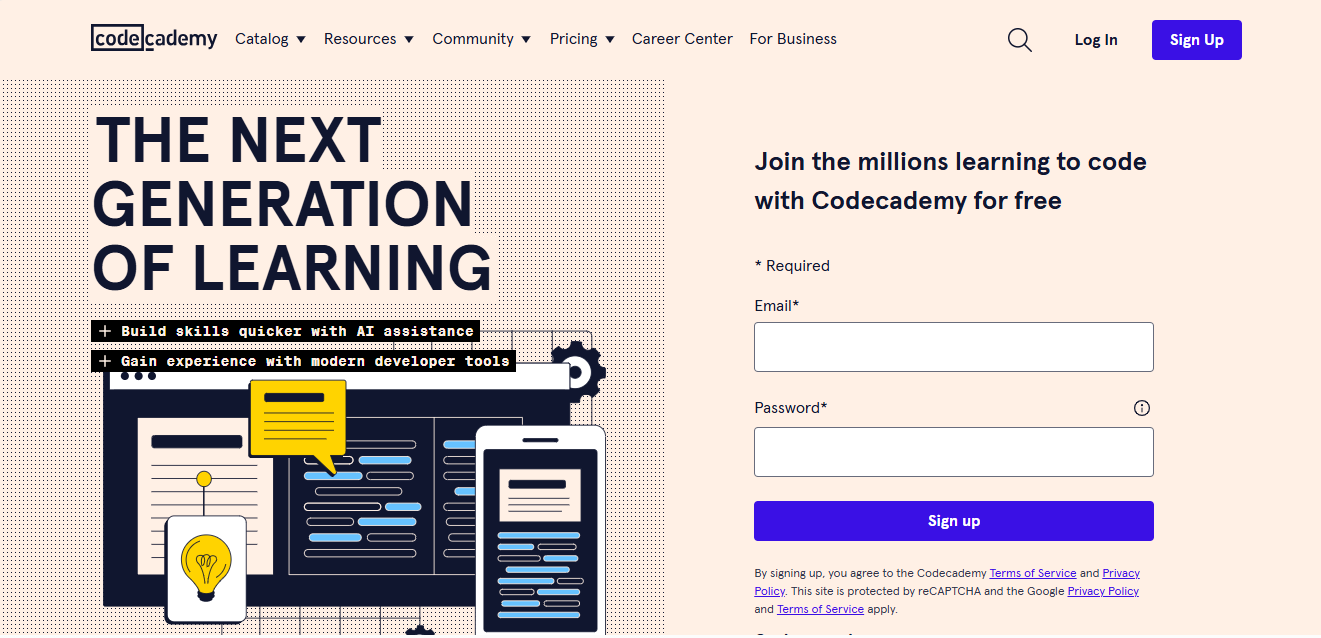 Overview and Commission Details
Overview and Commission Details
Codecademy is an interactive platform that teaches coding skills in various programming languages. The Codecademy Affiliate Program enables affiliates to promote its subscription plans for earning commissions.
Commission Structure:
Affiliates earn up to 50% commission on new Pro subscriptions initiated through their referral links.
Payment Options:
Payments are made via PayPal, with a minimum payout threshold of $50.
9. Pluralsight Affiliate Program

Overview and Commission Details
Pluralsight is an online technology skills platform that offers courses in software development, IT operations, data science, and more. The Pluralsight Affiliate Program allows affiliates to promote its subscription services.
Commission Structure:
Affiliates earn up to $200 per sale for each new subscriber who signs up through their referral link.
Payment Options:
Payments are processed through PayPal or direct deposit, with a minimum payout threshold of $100.
10. MasterClass Affiliate Program
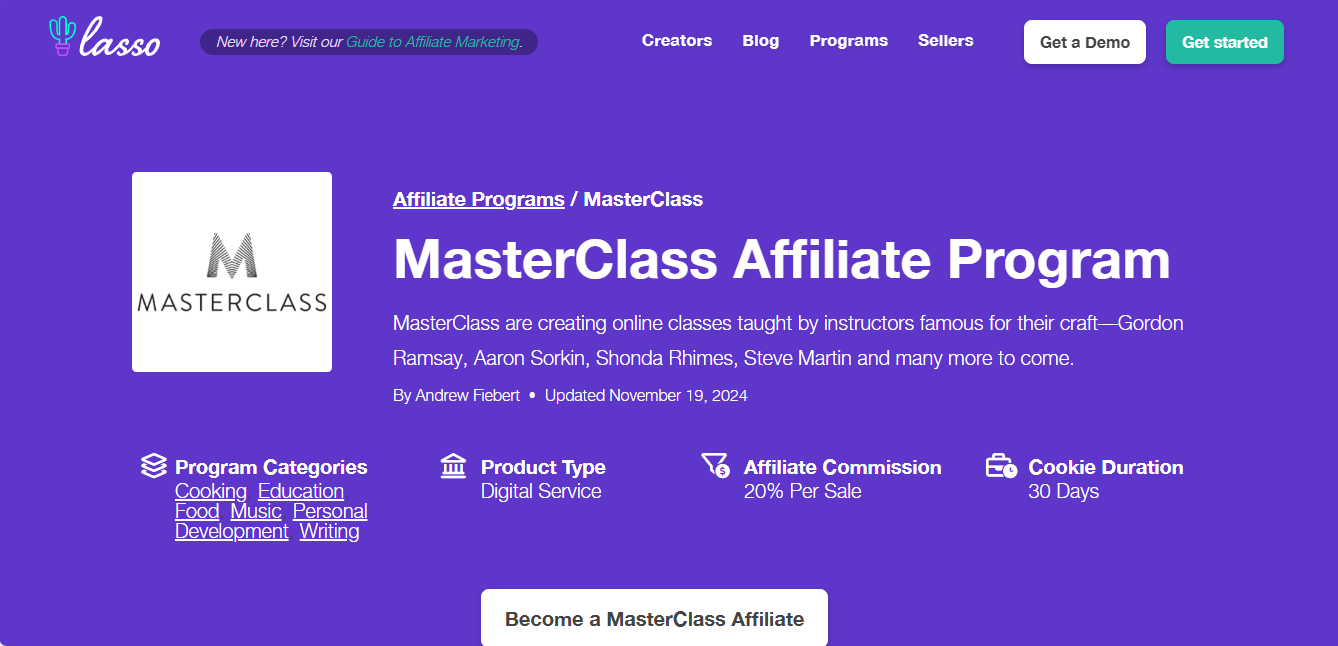
Overview and Commission Details
MasterClass offers online classes taught by renowned experts in various fields including cooking, writing, music, and more. The MasterClass Affiliate Program provides affiliates with the opportunity to promote these unique classes.
Commission Structure:
Affiliates earn $25 for every new member who signs up for an annual membership using their referral link.
Payment Options:
Payments are made via PayPal or bank transfer, with a minimum payout threshold of $50.
How to Get Started with Education Affiliate Marketing
Education affiliate marketing is a powerful way for individuals and organizations to earn income by promoting educational products and services. This guide will outline the essential steps to join an affiliate program, tips for effectively promoting educational products, and best practices for achieving success in this niche.
Steps to Join an Affiliate Program
1. Identify Your Niche
The first step in starting your education affiliate marketing journey is to identify your specific niche. This could range from online courses in technology, language learning, professional development, or even educational tools and resources for teachers. Understanding your niche will help you target the right audience and select relevant products to promote.
2. Research Affiliate Programs
Once you have identified your niche, research various affiliate programs that align with your interests. Look for reputable education affiliate networks such as Udemy, Coursera, Skillshare, and others that offer products related to your chosen niche. Evaluate their offerings, commission structures, and overall reputation in the market.
3. Sign Up for an Affiliate Program
After selecting a suitable program, sign up as an affiliate. The registration process typically requires basic information such as your name, email address, and payment details. Some programs may require you to provide information about your website or social media channels.
4. Explore Available Products
Once you are accepted into the program, browse through the available educational products or courses. Choose those that resonate with your audience and align with your content strategy. Consider factors such as course quality, popularity, and potential commission rates when making your selections.
5. Generate Unique Affiliate Links
After selecting the products, you want to promote, generate unique affiliate links provided by the program. These links track any sales or leads generated through your referrals, ensuring you receive proper credit for your efforts.
6. Create Quality Content
Develop engaging content that incorporates your affiliate links naturally. This could include blog posts reviewing courses, video tutorials showcasing educational tools, or social media posts highlighting the benefits of specific programs. Focus on providing value to your audience through informative and relatable content.
7. Promote Your Content
Share your content across various platforms where your target audience is active. Utilize social media channels like Facebook, Instagram, LinkedIn, and Twitter to reach a broader audience. Additionally, consider using email marketing to inform subscribers about new courses or educational resources.
8. Monitor Performance Metrics
Use analytics tools provided by the affiliate program to monitor the performance of your promotional efforts. Track metrics such as clicks, conversions, and earnings to understand which strategies are working best and where improvements can be made.
9. Optimize Your Strategies
Based on performance data, optimize your marketing strategies over time. Experiment with different types of content formats (videos, infographics) and promotional methods (paid ads, webinars) to determine what resonates best with your audience.
10. Stay Engaged with Your Audience
Building a relationship with your audience is crucial for long-term success in education affiliate marketing. Engage with them through comments on blog posts or social media interactions to foster trust and loyalty.
Tips for Promoting Educational Products Effectively
Focus on Quality Content Creation
Create high-quality content that provides value to your audience while promoting educational products. Use storytelling techniques to share personal experiences related to the courses or resources you are promoting.
Leverage SEO Techniques
Optimize your content for search engines by using relevant keywords related to education and the specific products you promote. This will help increase organic traffic to your content and improve visibility.
Utilize Social Media Effectively
Use social media platforms strategically to reach a broader audience. Share engaging posts that highlight the benefits of the educational products you promote and encourage followers to check them out through your affiliate links.
Engage in Online Communities
Participate in online forums or communities related to education where potential customers gather. Share valuable insights and recommendations while subtly promoting the products you are affiliated with.
Create Video Content
Video content is highly engaging and can be an effective way to promote educational products. Consider creating tutorials or reviews of courses on platforms like YouTube or TikTok to reach a wider audience.
Offer Exclusive Discounts or Bonuses
If possible, negotiate exclusive discounts or bonuses with the education providers you are promoting. This can incentivize users to sign up through your links rather than elsewhere.
Build an Email List
Collect email addresses from interested users through lead magnets like free e-books or webinars related to education topics. Use this list to send targeted promotions about relevant courses or resources.
Collaborate with Influencers
Partnering with influencers in the education space can enhance your reach significantly. Collaborate on content creation or joint promotions that benefit both parties while exposing each other’s audiences to new offerings.
Utilize Paid Advertising Strategically
Consider using paid advertising on platforms like Google Ads or Facebook Ads to target specific demographics interested in educational products. Ensure that your ads are well-crafted and lead users directly to high-converting landing pages.
Analyze Competitor Strategies
Keep an eye on competitors in the education affiliate space and analyze their promotional strategies. Identify what works well for them and consider adapting successful tactics into your own approach.
Best Practices for Success in Education Affiliate Marketing
Creating Quality Content That Converts
- Understand Your Audience’s Needs: Conduct research on what topics resonate most with your target audience within the education sector. Create content that addresses their pain points and offers solutions through the educational products you promote.
- Use Clear Calls-to-Action (CTAs): Incorporate clear CTAs throughout your content that guide users toward taking action—whether it’s signing up for a course or downloading a resource linked through your affiliate link.
- Incorporate Testimonials and Reviews: Use testimonials from past students or reviews of courses within your content to build credibility around the products you’re promoting; this helps potential customers feel more confident about their decisions.
- Optimize Content Layout for Readability: Ensure that your content is easy to read by using headings, bullet points, images, and short paragraphs; this enhances user experience and keeps visitors engaged longer on your page.
- Regularly Update Your Content: Keep your content fresh by updating it regularly based on new offerings from affiliates or changes within the education sector; this will help maintain relevance over time.
Utilizing Social Media for Promotion
- Choose the Right Platforms: Identify which social media platforms are most popular among your target audience (e.g., LinkedIn for professionals seeking career development courses) and focus your efforts there.
- Engage with Followers Consistently: Post regularly on social media while engaging with followers through comments or direct messages; building relationships can lead to higher conversion rates when promoting educational products.
- Share Valuable Resources Beyond Promotions: Provide value by sharing tips, articles, infographics related to education alongside promotional posts; this positions you as an authority figure in the space while also attracting potential customers.
- Utilize Hashtags Effectively: Use relevant hashtags when posting about educational products; this can help increase visibility among users searching for specific topics related to learning opportunities.
- Run Contests or Giveaways: Organize contests where participants can win free access to courses; this can boost engagement while also generating excitement around the products you’re promoting.
Building an Email List
- Create Lead Magnets: Offer valuable resources such as e-books, guides, or exclusive webinars in exchange for email sign-ups; this incentivizes users who are interested in educational topics.
- Segment Your Email List: Organize subscribers based on their interests (e.g., online courses vs tutoring services) so you can send targeted promotions tailored specifically toward their needs.
- Send Regular Newsletters: Keep subscribers engaged by sending out regular newsletters featuring updates about new courses available through affiliates along with valuable insights related to education trends.
- Personalize Email Campaigns: Personalization helps increase engagement rates; use subscribers’ names in emails and tailor content based on their previous interactions with promoted products whenever possible.
- Include Clear CTAs in Emails: Each email should have a clear call-to-action prompting readers toward taking action whether it’s signing up for a course or checking out a new resource linked via an affiliate link.
Conclusion
Selecting the right education affiliate network is key to maximizing your earning potential and achieving success in the competitive education niche. The network you choose can significantly influence your ability to promote relevant products effectively and earn consistent commissions.
By researching and comparing different networks, affiliates can identify the most rewarding opportunities while offering valuable educational resources to their audience. Partnering with the right network not only boosts revenue but also helps you contribute meaningfully to the learning journeys of students and professionals alike.
Frequently Asked Questions (FAQs)
What is education affiliate marketing?
Education affiliate marketing involves promoting educational products such as online courses or tutoring services through affiliate networks where marketers earn commissions based on sales generated from their referrals.
How do I choose which education affiliate program is right for me?
To choose an appropriate program consider factors like commission structure offered by each network along with product relevance based upon target audience interests researching reviews from other affiliates can also provide insight into reliability.
Can I promote multiple education affiliate programs at once?
Yes! Promoting multiple programs allows marketers access diverse offerings while reaching different segments effectively this strategy maximizes earning potential across various channels.
